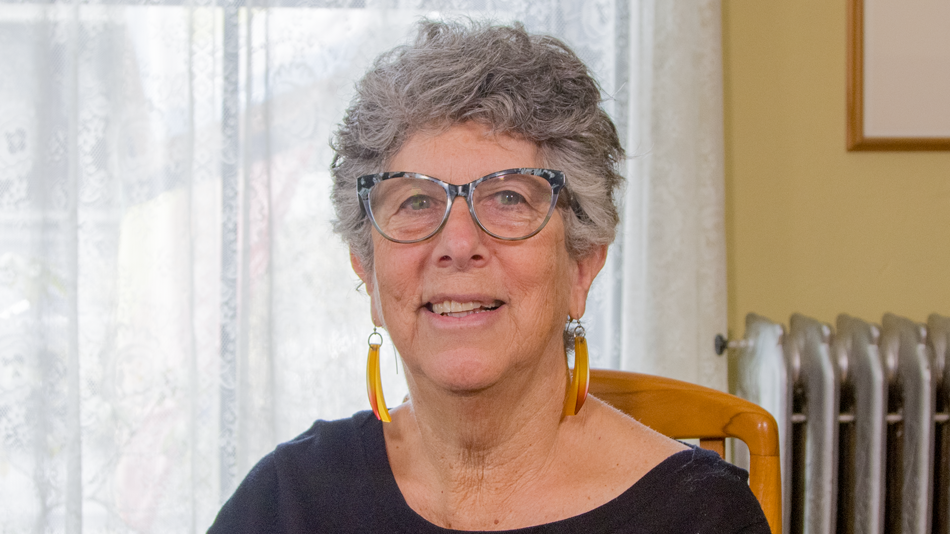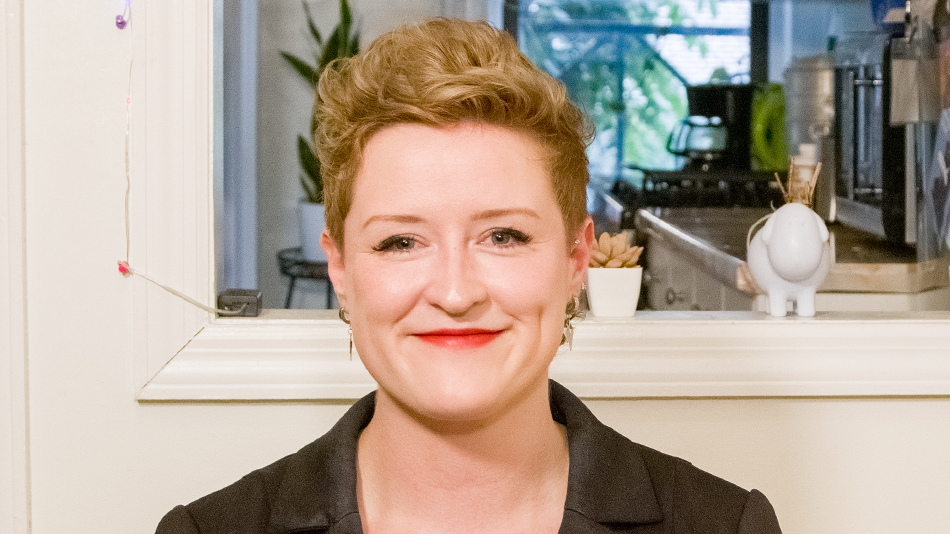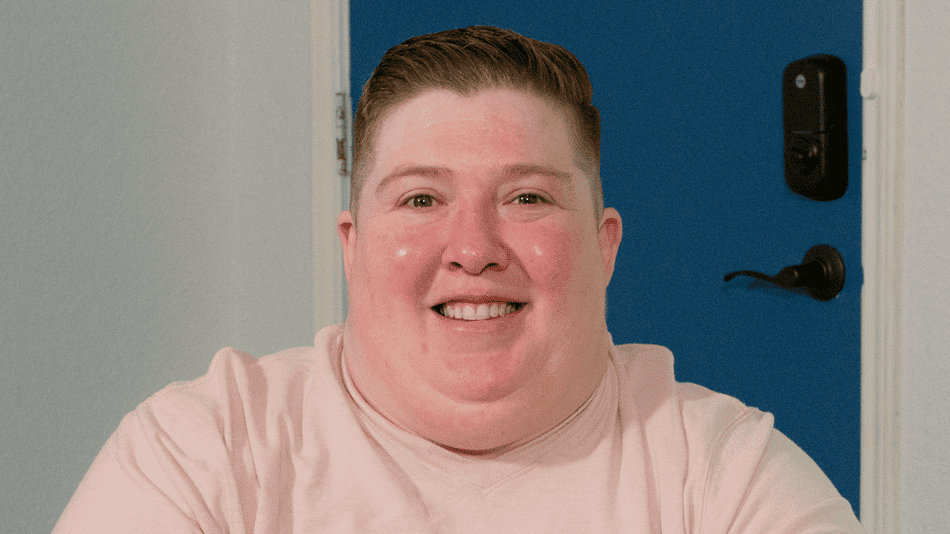My name is Brook Umbrell and I’m from Toledo, Ohio.
In 2014, I decided that was going to be my Summer of Yes. A good friend of mine was doing a queer calendar at the time. She’d been doing it for a couple of years. It was known to be kind of a racy calendar. She asked me if I would do a shoot with her, to be the calendar, and I would be topless. Of course, it being my Summer of Yes, I said yes.
I walked in that day and she looked at me and she said, “By the way, my assistant is going to be here later. She’s super hot. She speaks French.” The assistant comes in. She is gorgeous, just as my friend said. The whole shoot is done topless and she’s there with the bouquet of flowers underneath my boobs.
After the shoot, we all decided to go to this bar restaurant where my friend was working at night as a bartender. Mélanie, the French girl, she and I sat at the end of the bar for a couple of hours and just chatted.
I said, “You know, there’s this lesbian event going on if you’re still in town and you want to go with me, I’ll go.”
So I went to work that Friday and she sent me a message and she said, “Hey, are we still on for tonight?” And I thought about it and I suddenly got really worried. I was like, I know this is my Summer of Yes, but I am feeling really intimidated. I don’t even know this person. Why did I ask them to go and hang out with me?
I got to the place that we were supposed to meet super, super early. She arrives. We go out, hang out with friends. We went home. It was great. It was so much fun. We just had this really lovely evening together. When she left, I really thought that was it. She was going to leave. She was going to go back to France and go back to her life and I was going to go back to mine.
I just couldn’t shake her. She asked me to come and visit her and I went and it just was an amazing experience. We started trying to come up with a plan. What are we going to do? What does our future look like?
I said to her at one point, I said, “If we’re going to make this work, we need to be in the same city.” In 2015, one year later after we met, she came to the U.S. on a six-month visa. After living together for six months, we decided to make it happen. We planned our wedding in two weeks. Beautiful, amazing wedding. We had so much fun.
And then probably about five weeks later, you know, a month and a half later, we started the process for immigration. About six months after we had applied for her green card, we got a letter in the mail that said she was being denied. We had spent so much time apart that the thought of her leaving was like a sock in the stomach.
I called them and I’m thinking, okay, I’m going to call and I’m going to talk to this immigration officer and it’s all going to be fine, it’s just going to be a mistake. And they pretty much said, the gist of it was, “Yeah, we sent you a letter in the mail that was sent back to us with your scheduled date for your interview. We know you didn’t receive it. We’re denying you because you didn’t show up to this interview that you never knew you had.
We contacted a lawyer. We figured out that we have a couple of options. It’s essentially a status change and we can apply to reopen our case. We sent in the money, we applied and we were confident. Six months later, we get a letter in the mail and when we opened it, we were denied, once again, to reopen the case.
The first time we were denied, we were instructed to call the senator’s office and we had done, really, all we could to talk to whoever we could find to talk to in order to, kind of, turn this thing around. So, again, after the second denial, we called the senator’s office, they’re calling immigration.
I talked to my lawyer once again and I said, “You know, I think I’m going to make an appointment and actually go into Immigration. I’m going to talk to them face-to-face.”
She said, “I would advise against it. If you do go, I would advise you not to take her with you. If she does go and somebody there is having a bad day, they could detain her. She could be in a detention center or they could send her back to France.”
So I go into Immigration and you walk in and it’s this big, bright building. And I’m passing forms through the window, like “Here’s proof that we’re diligent about this! We’re legitimate. We’re trying to work this out.” The guy seemed really sympathetic. He was so nice.
He’s like, “Wow, you know, I know that you’re saying you were denied, but something in my system isn’t saying that you were denied.” So he said, “I’m going to go talk to my manager and I’ll be right back.”
He comes back and he said, “Unfortunately, you are denied and she’s going to have to go back.”
I looked at the guy and I said, “This really sucks.”
He said, “I know. It really sucks. The only thing that I can tell you to do is reapply again.” I met up with her after immigration and we’re sitting at a diner and we’re just trying to figure out our options. And I get a call on the phone and it’s the senator’s office.
They said, “We just got a call from immigration and they’re willing to reopen your case.” They reopened our case, they had to relook at it. A year after applying, just this last August, we finally got her green card. It was great. Her family was in town – her grandmother and her two cousins – and we were able to celebrate with them. This March 5th, we’re actually coming up on our two-year anniversary.
I’m lucky to live in a pretty diverse city. I’m in Chicago. Illinois is a blue state. You could be in a state that doesn’t support gay marriage and you might get a senator’s office that isn’t as supportive with immigration rights and gay rights. But I do have to realize that it is a privilege for me. I am a white woman and my wife is European. I think if this were different, I think if we were from a different country with a different sort of background, it would not have gone as smoothly.
I know that I could have listened to the lawyer and not gone on in there. I could have listened to my wife when she was like, “I’m scared. I don’t think that you should go.” Something in me said, “Do all you can.”
So when you think that something is impossible, keep pushing through. Try to make it work. If you believe in it, you can make it happen.








Share